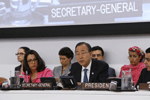News
Published on Thu, 2012-08-09 12:58

Panel on Defining the Future of
Trade. (Photo: TAG-Org)
|
A number of civil society organizations have strongly objected to the panel of “WTO stakeholders” formed recently by WTO Director-General Pascal Lamy and tasked to examine and analyze challenges to global trade in the 21st century, reported journalist Kanaga Raja on the South-North Development Monitor (SUNS) news service.
|
Published on Thu, 2012-08-09 12:56

UN Secretary-General
Ban Ki-moon briefs the
General Assembly.
(UN Photo/Devra Berkowitz)
|
The United Nations is preparing for a post-2015 Development Agenda to replace the Millennium Development Goals, with an advisory panel announced last week and a possible Development Summit in 2015, wrote Martin Khor, executive director of South Centre, in his most recent column for The Star, one of the leading Malaysian newspapers.
|
Published on Thu, 2012-08-09 12:54

Burning of rice residues after
harvest in Punjab, India. (Photo:
Neil Palmer/CIAT/Flickr/CC)
|
At least 25 Asian and international civil society organizations are calling to “act swiftly” to avoid “the impending disaster” and to “regain our momentum and defeat the system by targeting the source” of the global environmental crisis. Some of the groups that signed the appeal are the Movement for National Land and Agricultural Reform (Monlar, Sri Lanka), La Via Campesina and Focus on the Global South.
|
Published on Wed, 2012-08-08 15:41

Peter Niggli. (Photo: Swissinfo)
|
Conflicts on water all over the world responds to “the absence of recognized policy mechanisms and public institutions for managing water resources and allocating water in accordance with criteria that can be understood by the public” and can not be settled by market mechanisms, according to Peter Niggli, director of Alliance Sud, focal point of Social Watch in Switzerland.
|
Published on Mon, 2012-08-06 13:35

Photo: Xtra!
|
The Canadian Centre for Policy Alternatives' national office have just been moved to Under One Roof Properties, project that unites Ottawa-based progressive organizations with shared office spaces and facilities, aimed to foster an environment of interaction, collaboration and movement for social change.
|
Published on Fri, 2012-08-03 15:36

Protest in Barcelona. (Photo:
Davidlohr Bueso/Flickr/CC)
|
Emerging countries are being affected adversely by the European and US economic situations, according to Martin Khor, executive director of South Centre, in his most recent column for The Star, one of the leading Malaysian newspapers.
Rich countries’ demand is falling, as poor countries’ exports. Inflows of capital into developing nations have also slowed down, and a reversal to a new outflow situation may well take place. The lending conditions of banks in emerging economies have also deteriorated, explains Khor.
|
Published on Fri, 2012-08-03 15:34

Photo: Women in the Mediterranean
|
The newly written constitutional clause protecting women’s rights in the Tunisian constitution has angered feminists and opposition politicians with wording that calls women the “associate” of man, reported journalist Mischa Benoit-Lavelle on Tunisia Live news portal.
|
Published on Wed, 2012-08-01 08:38

Explosion at the Fukushima
nuclear power plant in Japan.
(Photo: Aliran)
|
More than thirty non-governmental organizations have come together to warn against Malaysian government’s plan to build two nuclear reactors without consulting the public. Some of the supporters of the statement are the Consumers’ Association of Penang, Third World Network, Sahabat Alam Malaysia, Tenaganita, TERAS Pengupayaan Melayu, Women’s Aid Organization, Centre for Independent Journalism and Stop Lynas Coalition.
|
Published on Wed, 2012-08-01 08:37

Small-scale gold miners in
Obuasi, Ghana. (Photo: George
Osodi/ Africa Renewal/Panos)
|
Obuasi, about 200 kilometres northwest of Accra, Ghana’s capital, is home to one of the richest gold mines in the whole world. For more than a hundred years the precious metal mined there has been taken to jewellers in the West and beyond, earning millions of dollars for mining companies and their shareholders, wrote journalist Efan Dovi Africa Renewal magazine, published by the United Nations.
|
Published on Tue, 2012-07-31 14:35

Emily Sikazwe. (Photo: St.
Francis Xavier University)
|
Zambian civil society organizations, especially those devoted to women’s rights, are demanding for the Republican Constitution now on debate to be approved through an assembly and a referendum. The first draft, launched by an official technical committee, contains progressive provisions on gender equality and the promotion of women’s rights, said Women for Change executive director Emily Sikazwe.
|
SUSCRIBE TO OUR NEWSLETTER
Submit

|












